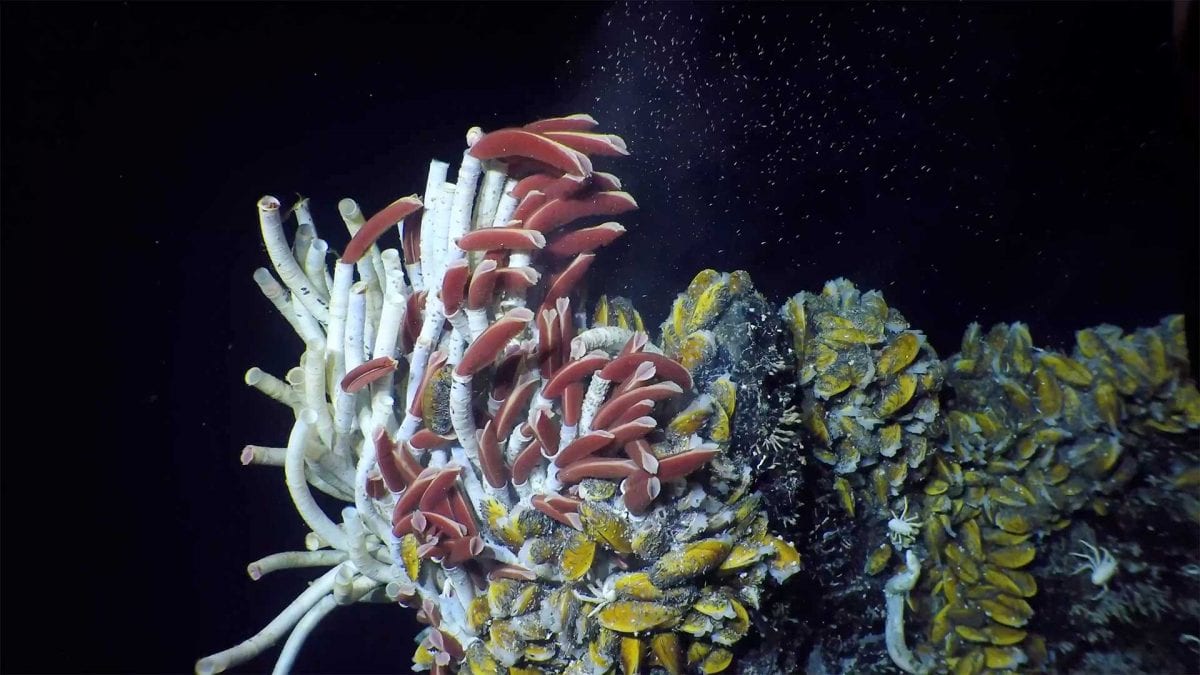Scientists call for decade of concerted effort to improve understanding of the deep ocean
 Courtesy of Jason Sylvan, Texas A&M Univ./NSF/HOV Alvin/2019/© Woods Hole Oceanographic Institution
Courtesy of Jason Sylvan, Texas A&M Univ./NSF/HOV Alvin/2019/© Woods Hole Oceanographic Institution November 25, 2020
The deep ocean—vast expanses of water and seafloor more than 200 meters (660 feet) below the surface—are globally recognized as an important frontier of exploration and research.
Despite the fact they account for nearly two-thirds of Earth’s surface area, however, very little is known about them, the ecosystems and life they support, and their impact on the health of the entire planet.
Now an international team of scientists representing 45 institutions, including the Woods Hole Oceanographic Institution (WHOI), and spanning 6 continents and 17 nations has called for a dedicated, decade-long program of research to greatly advance knowledge about these remote and, in many cases, entirely unexplored regions.
Scientists have named this initiative Challenger 150 to mark the 150th anniversary of the Challenger Expedition, the first modern oceanographic expedition that departed from Plymouth, U.K., in 1872. A century and a half later, the new program is timed to coincide with the United Nations Decade of Ocean Science for Sustainable Development that runs from 2021-2030.
Among its key aims would be to build greater capacity and diversity within the ocean science community, especially in light of the fact that existing deep-sea research is conducted primarily by scientists and institutions from developed nations.
It would also generate greater physical, biogeochemical, and biological data through the application of new and existing technology, and use those data to advance understanding of how changes in the deep seas impact the wider oceans and the rest of the planet.
The program would also look to use this new knowledge to support regional, national, and international decision-making on issues such as deep-sea mining, fishing, and conservation.
The rationale behind the call for action is presented in two articles being published simultaneously in top-tier research journals: a comment article in Nature Ecology and Evolution and a full blueprint of the program in Frontiers in Marine Science.
Led by Kerry Howell, Professor of Deep-Sea Ecology at the University of Plymouth (UK) and Ana Hilario, Researcher at the University of Aveiro (Portugal), the authors include female and male scientists from both developed and developing nations on six of the world’s seven continents.
“The deep ocean represents one of the last unexplored and untapped frontiers on Earth,” said WHOI Senior Scientist Chris German, who has been helping to shape the program since 2018. “Our deep oceans represent the largest habitat for life on Earth, but also remains the least understood. To sustainability manage this important food and mineral resource, we need to massively expand our ability to explore and understand. Just like the original Challenger Expedition in its day, this effort will demand new innovation and implementation of previously only dreamed-of tools. Pushing the limits of our technology to expand our knowledge of the planet will not only make us better stewards of our home planet, it will also set the stage for us to reach out, in future, and search for life beyond Earth in the newly discovered depths of other ocean worlds.”
Key takeaways:
- The year 2022 marks the 150th anniversary of the launch of HMS Challenger, a global survey ship that spent more than four years circumnavigating the globe to map the seafloor, record global ocean temperatures, and provide the first panoramic view of life in the deep ocean. The Challenger Expedition has since been characterized as the beginning of modern-day global-scale oceanography
- An international group of scientists is calling for the formation of Challenger 150, a decade-long, concerted effort, in the spirit of the original Challenger Expedition, to expand knowledge specifically of the under-studied deep ocean.
- An important aspect of the new Challenger 150 program would be its inclusivity—it would foster partnerships among scientists across multiple nations to share resources and knowledge that will build greater capacity and diversity within the ocean science community and support management of resources from the local to global scale.
Related links
Wave Glider provides gateway to remote exploration
Chris German's vision for robot-enabled exploration of Earth and other Ocean Worlds
Howell, K. and H. Hilario, et al. (2020)
A Decade to Study Deep-Sea Life.
Nature Ecology and Evolution.
Howell, K. and H. Hilario, et al. (2020)
A blueprint for an inclusive, global deep-sea Ocean Decade field programme.
Frontiers of Marine Science.
The Woods Hole Oceanographic Institution is a private, non-profit organization on Cape Cod, Mass., dedicated to marine research, engineering, and higher education. Established in 1930 on a recommendation from the National Academy of Sciences, its primary mission is to understand the oceans and their interaction with the Earth as a whole, and to communicate a basic understanding of the oceans’ role in the changing global environment. For more information, please visit www.whoi.edu.
